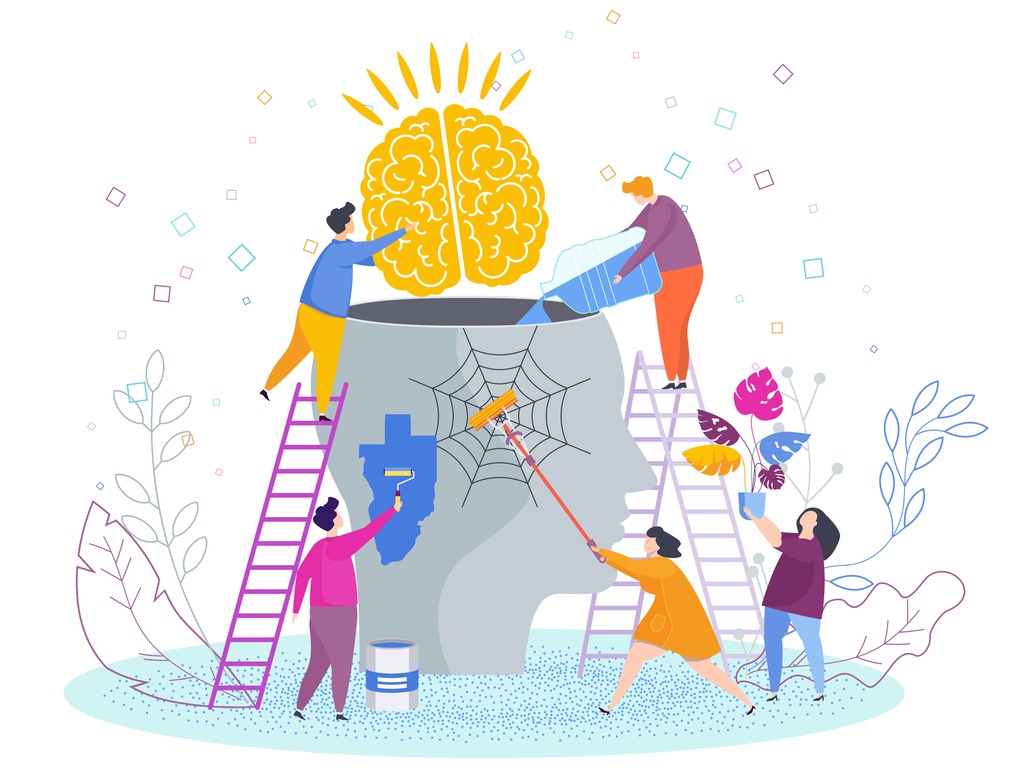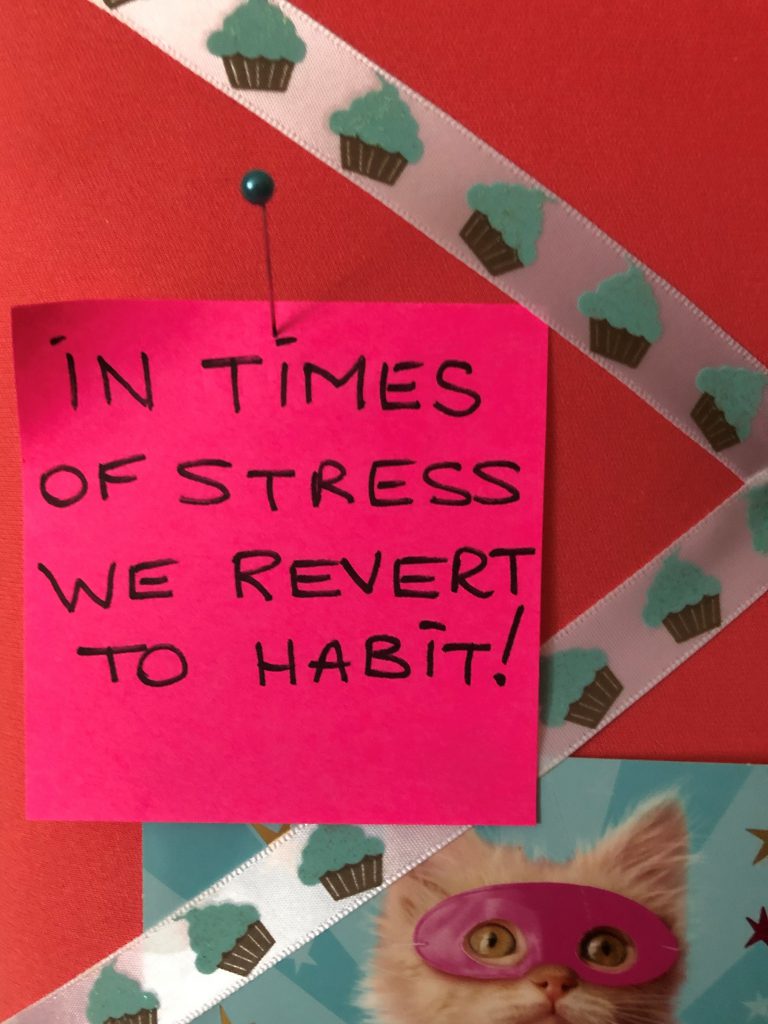
Glynis Devine explains how the power of habit is the key to maintaining control amid chaos
“Did you just say, ‘thank you’ – to her?!” he jeered.
“Yes. Why?” I challenged with a tone that said, ‘don’t push this’. He obviously didn’t hear the warning because he continued.
“Why did you say, ‘thank you’ – to her? That’s ridiculous!”
‘Her’ was Alexa – my Alexa… the AI kind.
And ‘he’ was my husband who was listening to me thank Alexa from the living room while I cooked in the kitchen.
I was making tortières – a savoury French Canadian staple that’s a non-negotiable menu item of most Quebecers’ ‘reveillon’ (New Year’s Eve). While I’m a huge foodie, I had never tackled this delight. It wasn’t a complex recipe to follow – a pie containing beef, pork, potatoes, breadcrumbs, broth, and most of the spices you’d muster to cook a turkey AND bake gingerbread cookies – together! No wonder it is a holiday favourite; it really IS delicious!
It was the pastry that was challenging my culinary prowess! Memories of my Auntie June’s flakey, whisper-light, moan-inducing Congress Tarts have set the bar I was striving, elusively, to achieve. It’s a quest I’ve been on for the better part of decades of my adult life. And the goal was to nail it with five of Pinterest’s best pastry recipes cobbled together – combined with the perfect timing.
I had instructed Alexa to set a timer for 30 minutes while my plastic-wrapped disks of meticulously measured and only-barely-mixed dough chilled. A moment too soon or too late to take the disc out to roll could make or break victory. Alexa’s pulsing tone that told me the 30-minute wait was up had an urgency implied ‘Get the dough! Get the dough!’
Grateful that Alexa was in the trenches with me sharing the angst – and victory I hoped – of creating the perfect crust and making Auntie June proud in the afterlife, I thanked her. That’s how this debate had started.
Building Good Habits
“Remember last week when you told Cecelia* she had to put on her flasher – at ALL times?”
My sixteen-year-old got her learner’s permit to drive a few weeks ago. Since then, in the name of all supportive and encouraging parents, we’ve been subjected to nail-biting chauffeuring around town.
With only the four compulsory theory classes and one in-car instruction completed so far, Cecelia changes lanes like the shiny ball in a vintage pinball machine off rubber-hugged bumpers – at 70-degree (nerve-rattling!) pivots.
“Dad, I’m IN the lane that’s turning; I don’t need to signal, too!” she said with hyperbolic exaggeration, a head rattle, and a thunderous eye roll – the combination of which only a teen can execute, simultaneously.
“Repetition builds habit. And good habits can save you in times of chaos” he started – and continued with a long recant of the merits of repetition and the merits of habit.
In the passenger seat, I executed an eye roll of my own…. the passive-aggressive kind of eye roll that a woman in her fifties, whose mantras have fallen on deaf ears for many years, does.
‘Pretty sure you learned all about habit building from me!’, I imagined saying out loud.
I have a board of stickies with quippy reminders of the common sense that should be at the forefront of my mind. I find, like you may, that in times of complete chaos no one (including me) seems to have common sense at the forefront of their minds!
On the board is a bright pink stickie that says, ‘IN TIMES OF STRESS WE REVERT TO HABIT.’

It reminds me of the importance of exercising good habits when they don’t seem necessary. That way, during chaos, they are the default habits I will summon to tackle the challenge that chaos presents.
Have you ever driven home responding to an emergency and been surprised when you got there that you didn’t remember any elements of the route you drove?
Have you ever driven to work – deep in thought – and miraculously arrived unscathed without remembering the drive – like at all?
That’s the power of habit at work. You do it so often that it’s an amnesiac task – you do it on autopilot, with flawless results.
So, like me saying, ‘thank you’ to my Alexa for AI cooking assistance and like Cecelia putting on the turn signal to indicate she was turning when she was already in a turn-only lane… it trains our brain to perform best practices, consistently. It reinforces good habits even when it seems unnecessary to do so in that instance. That way, during chaos, your brain goes to the good habits instead of the bad ones to tackle challenges.
Have you experienced chaos lately?
Most good habits I had became moot 11 months ago when every work and home task I did, changed.
- I problem-solve with my clients online now instead of in person over coffee in a swanky coffeehouse with indie music playing.
- I order my mother’s groceries online and have them delivered now instead four-hour, bi-weekly grocery shopping trips with her to Walmart.
- I design, print, package, and ship learning manuals to my participants online now without ever stepping foot in a Staples or a post office.
- I speak, train, and emcee online now instead of in person in large convention centre ballrooms.
- I enjoy gourmet meals to a YouTube video of elegant jazz in my home only now instead of downtown in my favourite restaurant to the sounds of a live band.
- I see my doctor online now instead of in person.
I’ve had to re-train my brain about almost everything! And I sense you have too.
I’ve had to go back to the drawing board – the quilted push-pin board with pink stickies in this case – and rebuild good habit in new milieus.
In Times of Stress We Revert to Habit
I remember writing that proverbial stickie on the importance of habit… while skydiving!
I was phoning around to see what was involved to sky dive with my baby brother. It had been scheduled for my 40th birthday.
Three months before the day we were to celebrate this bucket list experience together, I found out I was pregnant with my youngest, Cecelia (the driving maverick). It had gotten deferred almost a decade and I refused to let it linger any longer without putting a check mark next to it on my paper list with the bucket watermark.
Every sky dive centre I called said the same thing, ‘it’s an eight-hour course and you jump at the end.’
“Seriously? Eight hours??” I’d stopped in to a centre nearest our home. The thrill-seeking enabler, a 20-year-old gutsy woman, gave me the identical response as the other centres I’d called. “What do they possibly have to teach me that takes eight whole hours?” I asked, exasperated.
“Oh, it’s not what they have to teach you that takes that long; it’s what they have to UNteach you that does” she patiently explained.
I rolled that over in my brain.
It’s what they have to UNteach you to survive – and thrive! – jumping out of a plane.
“How so?” I challenged her.
“In times of stress we revert to habit. Most people’s habit when they jump out of a metal tube three thousand feet above all they hold dear is to scream ‘AGGGGGGGGHHHHHHH!!!!!’ until they hit the pavement – splat!” she said for emphasis while slapping one hand on the other. “That’s not good for business!” she teased.
“It takes us eight hours to UNtrain your brain to do that. For four hours we REtrain your brain to jump – and pull the rip cord to release the parachute. Jump and pull, jump and pull, jump and pull” she sang while she danced a jig around the reception desk. “Then, we break for lunch,” she emphasized with a pregnant pause. “Then we ‘jump and pull’ for four hours more. Then – and ONLY then – it’s showtime!” she displayed with jazz hands.
“And you know what?” she giggled with whopping, big green eyes.
“Miraculously, your white-knuckled, terrified brain forgets the old habit of just screaming – and splatting – and jumps and pulls the rip cord and floats safely back to base. There may be a bit of screaming…” she whispered surreptitiously.
Many of your daily routines have changed. The task may be similar; the execution is likely (very) different. Add that to the challenges administrative professionals intermittently face. Having a new tool – or a well-practiced one in this case – to face chaos helps!
To counteract chaos – and the new approaches, platforms, and milieus we’re all experimenting with to execute our regular daily tasks – consider this strategy: aim to find ways to automate the repetitive tasks… not with a machine or an app. Aim to train your brain to apply best practices consistently to a task or conversation – even when it seems unnecessary.
If you consistently say ‘please’ and ‘thank you’ you won’t forget to during chaos when relationship-building is critical to drive success.
If you REtrain your brain not to cut corners when you could (like not signalling a turn when you’re already in a turn-only lane or saying, ’thank you’ to a non-human) – and to consistently apply best practice methods when you could really get by with good practices, you’ll guarantee better, more reliable results. Then, amid chaos, your brain will automatically ‘get you there unscathed’ like the amnesiac drive to work.
In times of stress, we revert to habit.
What good habits will you practice to support you in this new age of chaos?
*Cecilia requested that her name be changed to protect her privacy.












